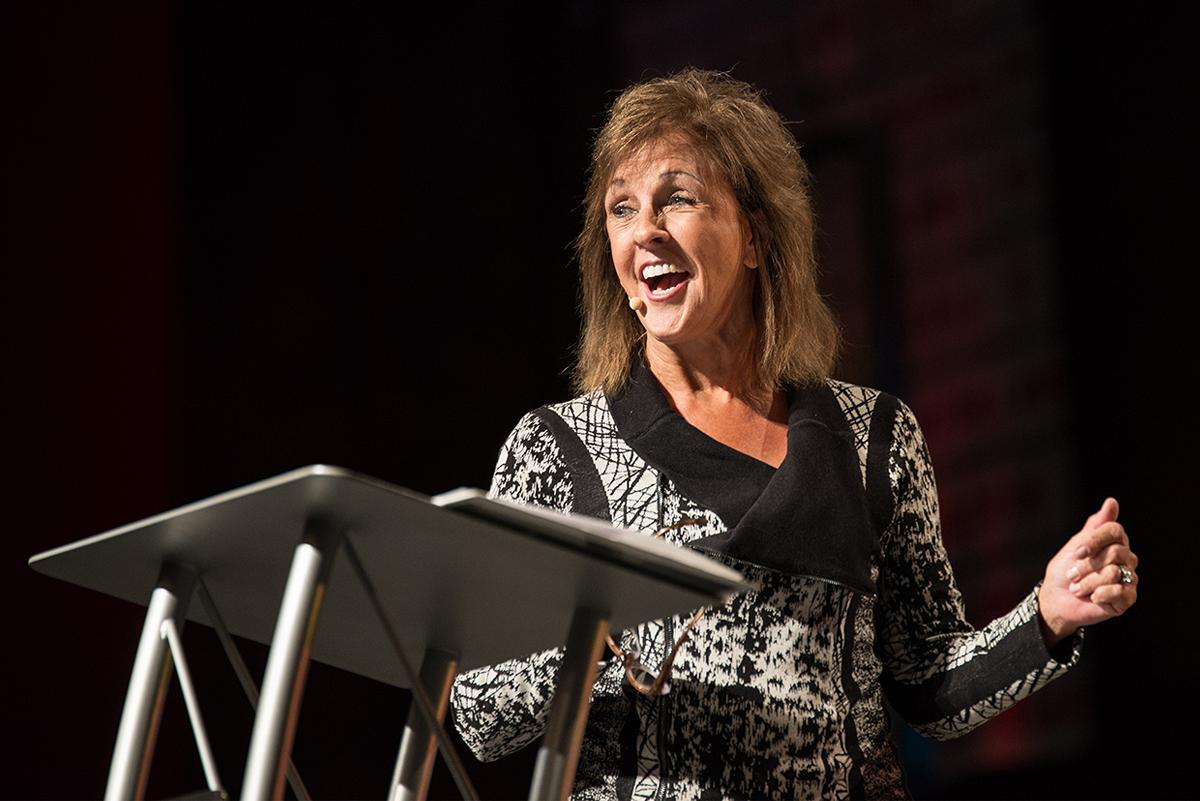
Early Wednesday morning, students packed into Chase Gymnasium and five overflow spaces, to kick off Torrey Conference 2014. Geometric designs decorated each conference space representing this year’s theme of Collide, which addresses conflict.
“It’s about how we deal with tensions in our lives, and the brokenness that we call experience, not only in the relationships but even in ourselves,” said President Dr. Barry Corey, in his opening comments to the conference. “My prayer is that there will be healing that happens during these few days, but also that you’d become a peacemaker as you go from here.”
Anne Beiler, the founder of Auntie Anne’s pretzel company, spoke at Session A, titled “Overcoming Pain, Blame and Shame.” Beiler shared her experience with conflict and her journey through depression and guilt after the death of her daughter Angela. Beiler’s talk emphasized the forgiveness resulting from confession to both God and others.
“An amazing part of being a believer is to absolutely know that you are forgiven, because when you know that you are forgiven, your life will drastically change,” Beiler said. “It’s what Jesus did for us on the cross. The work he did was and is complete.”

FINDING RESOLUTION IN THE MIDST OF CONFLICT
Transitioning from the topic of confession, speaker Gary Friesen emphasized the importance of the gospel when dealing with different conflicts during Session B. Friesen’s extensive legal experience working both within the church and in a secular field have given him a broad range of knowledge of conflict.
Friesen tackled both the causes of conflict and ways to find resolution. He began by introducing the three main triggers that will cause conflicts that will predictably pop up throughout our lives, as well as some solutions.
Rifts that develop between people and groups based on personality, interests, race, cultural or personal background can prove difficult to reconcile when there exists little common ground for opposing parties to connect over, said Friesen. Misunderstandings can arise out of seemingly harmless situations and offenses between two parties can escalate quickly, he explained.
The third main source of conflict comes from our own sinful desires, Friesen said. The problem arises when our desires become a demand, and then we expect others to conform to our desires.

RESPONDING TO CONFLICT
Friesen’s sister-in-law Annette Friesen also spoke at Session C from 2:00 p.m. to 3:00 p.m.. Where Gary spoke on the topic of discovering the roots and resolutions of conflict, Annette explained the responses to conflict. Students received pamphlets outlining how conflicts can result in a variety of responses from harming oneself to harming others.
“The first thing that we try to do when we try to escape conflict is we try to deny,” Annette said when explaining the diagram in the pamphlet labeled “The Slippery Slope” of conflict. “Or, sometimes we just leave a situation. Of course, the ultimate escape is suicide, which is still the third leading cause of death for teens in the United States. Obviously, we’re not doing a very good job of teaching teens how to deal with conflict.”
RECONCILIATION AND REDEMPTION
Later in Session D, Gary returned to continue his explanation of ways we can address conflicts. Even in our brokenness, he said, there is a redemptive purpose in resolving conflict biblically.
“Our love for each other, the way we respond to each other in conflict, would be a message to the world about the gospel itself,” Gary said.
Confessing sins and seeking awareness of our own fault helps to bring transparency and understanding to a situation as well as gently restoring relationships by graciously overlooking minor offenses or seeking help through a mediator within the church, Gary said.
From his own experiences, Gary knows how painful relationships can be and how confusing it is to sort through the many elements of offense. That said, he explained how vital forgiveness and reconciliation are in the lives of Christians.
“Forgiveness is at the center of who you are as a person, as a follower of Christ,” Gary said.







